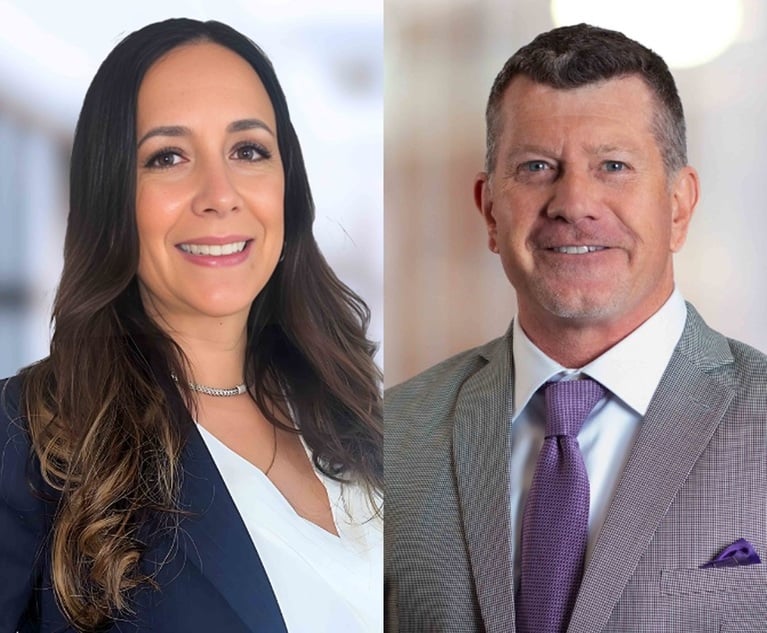 (l-r) Adam Schachter, Dan Gelber and Gerald Greenberg, partners with Gelber Schachter & Greenberg in Miami. Courtesy photo
(l-r) Adam Schachter, Dan Gelber and Gerald Greenberg, partners with Gelber Schachter & Greenberg in Miami. Courtesy photoMiami Law Firm Promises Personal Attention, Flexible Billing While Hiring Ex-Clerks
Gelber Schachter & Greenberg focuses on complex commercial litigation and white-collar criminal defense. Here's an overview of the firm.
October 04, 2019 at 10:41 AM
7 minute read
Dan Gelber, Adam Schachter and Gerald Greenberg decided to leave larger law firms behind in 2012 and open their own.
The primary focus at Gelber Schachter & Greenberg was a niche combination of civil and criminal practices — complex commercial litigation and white-collar criminal defense. The two areas might seem like a square-peg-in-round-hole situation, but they fit well in the capital of health care fraud and a region with a long history of sophisticated scams.
The founders expanded the Miami firm to eight attorneys and refined the hiring process by looking primarily for attorneys with experience as federal clerks for the legal grounding that instills.
Gelber, who was re-elected without opposition in September to a second term as Miami Beach mayor, maintains a full-time law practice. He served as a state senator and state representative for 10 years, another 10 as a federal prosecutor and worked at Akerman and Holland & Knight.
Schachter, a former federal clerk, and Greenberg, a former federal clerk and Miami federal prosecutor, left Stearns Weaver Miller Weissler Alhadeff & Sitterson for the startup.
The founding partners offer an overview of the firm.
Firm: Gelber Schachter & Greenberg
Firm Leaders: Dan Gelber, Adam Schachter and Gerald Greenberg, founding partners
Head Count: We have eight lawyers, but we intend to add lawyers consistent with our prior hires — primarily former federal law clerks.
Location: Miami
Practice Areas: Our primary practice areas are complex commercial litigation and white-collar criminal defense. On the civil side, we handle high-stakes matters for individuals and companies — as plaintiffs and defendants — in federal and state courts in Florida and across the country. Our white-collar criminal practice is led by former federal prosecutors who represent clients from the investigatory stage through trial in areas such as health care fraud, securities fraud and the Foreign Corrupt Practice Act. We also represent clients in areas that combine our civil and criminal expertise, such as in parallel proceedings and qui tam cases.
Governance structure and compensation model: In addition to our three founding partners, we have two other partners, Freddy Funes and Brian Toth. We operate our firm with the shared goal of providing the highest caliber of legal representation to our clients. Our compensation model is to offer base salaries competitive with other Miami firms but also with discretionary bonuses that allow all our lawyers to participate in the firm's success.
Do you offer alternative fee arrangements? Yes. As a small firm, we are flexible and entrepreneurial when it comes to managing our business. We view each case as an opportunity to align our interests with our clients' interests. In some cases, that might mean we bill hourly or charge a flat rate; in others, that might mean we work fully on contingency or with a hybrid model that combines hourly and contingency. We also handle many pro bono and public interest matters.
What do you view as the two biggest opportunities for your firm, and what are the two biggest threats? As a small firm with extremely talented lawyers who have prior big-firm and governmental experience, our biggest opportunities relate to our ability to provide top-level clients with personal attention that they often might not find at the largest firms. At the same time, we are able to be flexible in our billing and overall approach to the case. The one constant is that all of our lawyers play an active and collaborative role in achieving the best possible results for our clients. Some of our biggest challenges come from clients' perception that they need to hire large international firms to do their work, though we have been able to overcome that perception consistently. More than anything, perhaps our biggest challenge has been keeping up with workload while staying lean and hiring only lawyers who meet our standards. Thus far, we have been very fortunate in that regard.
The legal market is so competitive now — what trends do you see, and has anything, including alternative service providers, altered your approach? Is your chief competition other mid-market firms, or is your firm competing against big firms for the same work? In both civil and criminal work, we find ourselves being considered for cases along with large international firms and small firms built like ours. Although on some level the smaller firms are our direct competitors, we benefit from having them in the market because we refer cases to each other and, as appropriate, we pool resources to work on matters efficiently. If anything, the trend toward smaller firms — particularly on the white-collar side — has enhanced our practice as clients become more comfortable looking to groups like ours. In our experience, clients no longer limit themselves to hiring either big firms or small firms; clients simply want the best lawyers to deliver the best results.
There is much debate around how law firms can foster the next generation of legal talent. What advantages and disadvantages do small and midsize firms have in attracting and retaining young lawyers, particularly millennials? We started this firm because we wanted to create a place where we could work on the best cases with the best lawyers while getting real, hands-on experience from day one. Young lawyers coming to our firm know that they will get court experience, get client contact and play active roles in all aspects of a case — something that they often do not get at a big firm. We believe that by adhering strictly to our policy of hiring only lawyers with federal clerkship experience we make it that much more likely that we can attract the next crop of great young lawyers. Thus far, we have been proven correct as our early hires have resulted in the hiring of other great lawyers.
Does your firm employ any nonlawyer professionals in high-level positions (e.g. COO, business development officer, chief strategy officer, etc.)? If so, why is it advantageous to have a nonlawyer in that role? If not, have you considered hiring any? We do not. We have an outstanding office manager who fills many of those roles, and we hire outside businesses to fill in any gaps. At this point, we are able to both practice and manage our business effectively and efficiently, but we are mindful that we might need to alter that approach as our business grows.
What would you say is the most innovative thing your firm has done recently, whether it be technology advancements, internal operations, how you work with clients, etc.? Among firms our size, we are unique in our equal commitment to complex civil litigation and white-collar criminal work. Although other firms do outstanding work in these fields, we consider ourselves leaders and innovators in our ability to combine the two areas, often handling cutting-edge cases that involve both civil and criminal aspects. Our lawyers' diverse experiences allow us to craft novel strategies that take both areas into account, and we remain committed to working with our clients to continue developing in this way.
Does your firm have a succession plan in place? If so, what challenges do you face in trying to execute that plan? If you don't currently have a plan, is it an issue your firm is thinking about? Our succession plan is to carefully and strategically hire talented and dynamic young lawyers who will grow with the firm and lead it into the future.
This content has been archived. It is available through our partners, LexisNexis® and Bloomberg Law.
To view this content, please continue to their sites.
Not a Lexis Subscriber?
Subscribe Now
Not a Bloomberg Law Subscriber?
Subscribe Now
NOT FOR REPRINT
© 2024 ALM Global, LLC, All Rights Reserved. Request academic re-use from www.copyright.com. All other uses, submit a request to [email protected]. For more information visit Asset & Logo Licensing.
You Might Like
View All
Anticipating a New Era of 'Extreme Vetting,' Big Law Immigration Attys Prep for Demand Surge
6 minute read
Zero-Dollar Verdict: Which of Florida's Largest Firms Lost?

Florida-Based Law Firms Start to Lag, As New York Takes a Bigger Piece of Deals
3 minute read
Trending Stories
- 1Pa. Supreme Court Taps New Philadelphia Family Division Administrative Judge
- 25th Circuit Rules Open-Source Code Is Not Property in Tornado Cash Appeal
- 3Mediators for the Southern District of New York Honored at Eighth Annual James Duane Awards
- 4The Lawyers Picked by Trump for Key Roles in His Second Term
- 5Pa. High Court to Weigh Parent Company's Liability for Dissolved Subsidiary's Conduct
Who Got The Work
Michael G. Bongiorno, Andrew Scott Dulberg and Elizabeth E. Driscoll from Wilmer Cutler Pickering Hale and Dorr have stepped in to represent Symbotic Inc., an A.I.-enabled technology platform that focuses on increasing supply chain efficiency, and other defendants in a pending shareholder derivative lawsuit. The case, filed Oct. 2 in Massachusetts District Court by the Brown Law Firm on behalf of Stephen Austen, accuses certain officers and directors of misleading investors in regard to Symbotic's potential for margin growth by failing to disclose that the company was not equipped to timely deploy its systems or manage expenses through project delays. The case, assigned to U.S. District Judge Nathaniel M. Gorton, is 1:24-cv-12522, Austen v. Cohen et al.
Who Got The Work
Edmund Polubinski and Marie Killmond of Davis Polk & Wardwell have entered appearances for data platform software development company MongoDB and other defendants in a pending shareholder derivative lawsuit. The action, filed Oct. 7 in New York Southern District Court by the Brown Law Firm, accuses the company's directors and/or officers of falsely expressing confidence in the company’s restructuring of its sales incentive plan and downplaying the severity of decreases in its upfront commitments. The case is 1:24-cv-07594, Roy v. Ittycheria et al.
Who Got The Work
Amy O. Bruchs and Kurt F. Ellison of Michael Best & Friedrich have entered appearances for Epic Systems Corp. in a pending employment discrimination lawsuit. The suit was filed Sept. 7 in Wisconsin Western District Court by Levine Eisberner LLC and Siri & Glimstad on behalf of a project manager who claims that he was wrongfully terminated after applying for a religious exemption to the defendant's COVID-19 vaccine mandate. The case, assigned to U.S. Magistrate Judge Anita Marie Boor, is 3:24-cv-00630, Secker, Nathan v. Epic Systems Corporation.
Who Got The Work
David X. Sullivan, Thomas J. Finn and Gregory A. Hall from McCarter & English have entered appearances for Sunrun Installation Services in a pending civil rights lawsuit. The complaint was filed Sept. 4 in Connecticut District Court by attorney Robert M. Berke on behalf of former employee George Edward Steins, who was arrested and charged with employing an unregistered home improvement salesperson. The complaint alleges that had Sunrun informed the Connecticut Department of Consumer Protection that the plaintiff's employment had ended in 2017 and that he no longer held Sunrun's home improvement contractor license, he would not have been hit with charges, which were dismissed in May 2024. The case, assigned to U.S. District Judge Jeffrey A. Meyer, is 3:24-cv-01423, Steins v. Sunrun, Inc. et al.
Who Got The Work
Greenberg Traurig shareholder Joshua L. Raskin has entered an appearance for boohoo.com UK Ltd. in a pending patent infringement lawsuit. The suit, filed Sept. 3 in Texas Eastern District Court by Rozier Hardt McDonough on behalf of Alto Dynamics, asserts five patents related to an online shopping platform. The case, assigned to U.S. District Judge Rodney Gilstrap, is 2:24-cv-00719, Alto Dynamics, LLC v. boohoo.com UK Limited.
Featured Firms
Law Offices of Gary Martin Hays & Associates, P.C.
(470) 294-1674
Law Offices of Mark E. Salomone
(857) 444-6468
Smith & Hassler
(713) 739-1250






